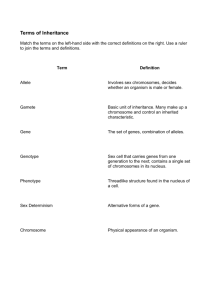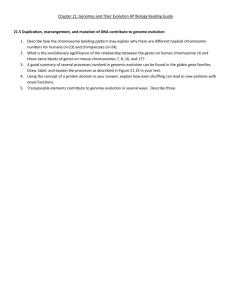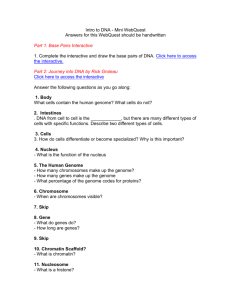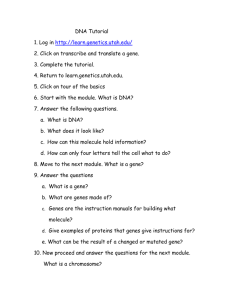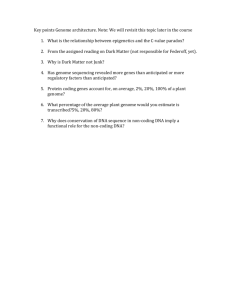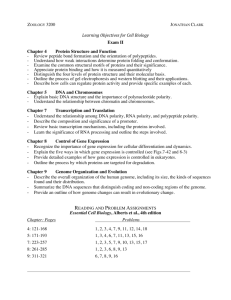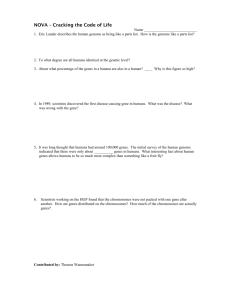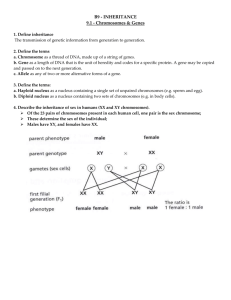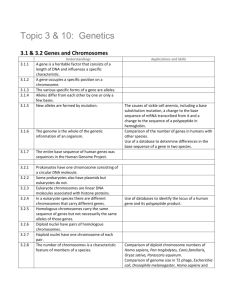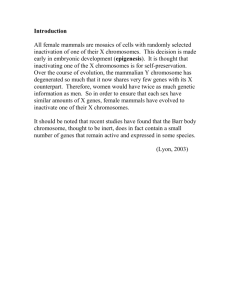Chapter The Human Genome
advertisement
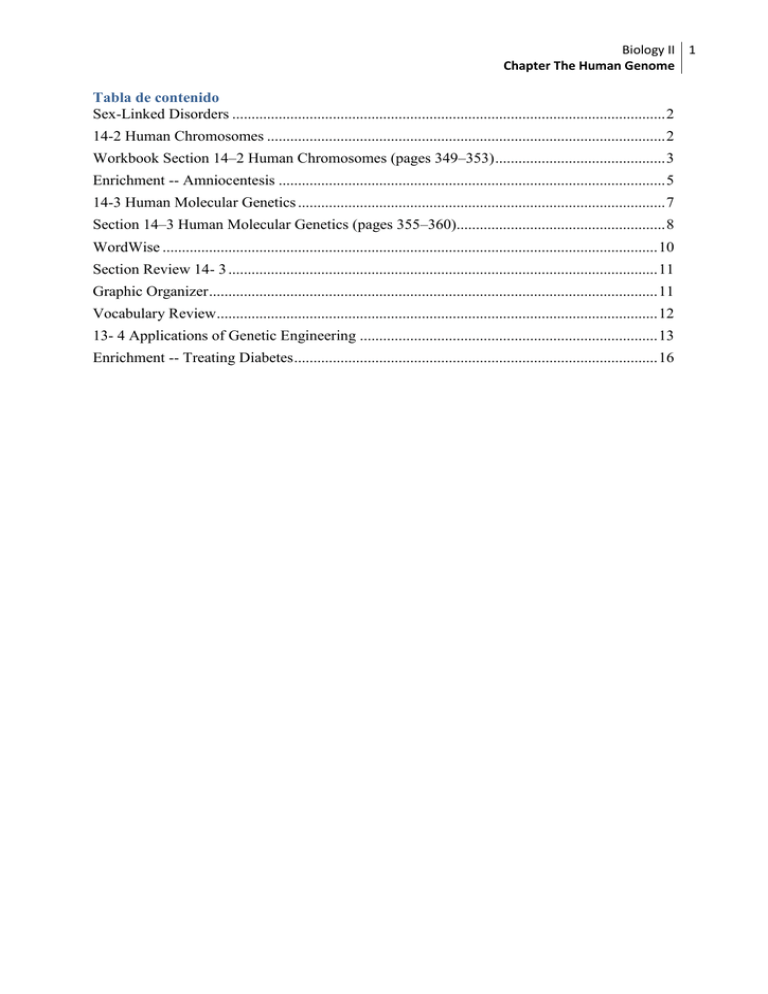
Biology II 1 Chapter The Human Genome Tabla de contenido Sex-Linked Disorders ................................................................................................................ 2 14-2 Human Chromosomes ....................................................................................................... 2 Workbook Section 14–2 Human Chromosomes (pages 349–353) ............................................ 3 Enrichment -- Amniocentesis .................................................................................................... 5 14-3 Human Molecular Genetics ............................................................................................... 7 Section 14–3 Human Molecular Genetics (pages 355–360)...................................................... 8 WordWise ................................................................................................................................ 10 Section Review 14- 3 ............................................................................................................... 11 Graphic Organizer .................................................................................................................... 11 Vocabulary Review .................................................................................................................. 12 13- 4 Applications of Genetic Engineering ............................................................................. 13 Enrichment -- Treating Diabetes .............................................................................................. 16 Biology II 2 Chapter The Human Genome Sex-Linked Disorders The X and Y chromosomes are the sex chromosomes. Females have two X chromosomes. Males have one X and one Y chromosome. Because males have only one allele for X-linked genes, the allele is expressed, even if it is recessive. The pedigree below shows the offspring of a female carrier of hemophilia and a male who does not suffer from the disorder. Use the pedigree to answer the questions. 1. Color each square or circle that indicates an individual who is a carrier of the hemophilia trait in red. 2. Color each square or circle that indicates an individual who has hemophilia in blue. 3. Could these parents have a daughter with hemophilia? Explain. ___________________________________________________________________________ ___________________________________________________________________________ 4. Why are sex-linked diseases more common in males than in females? ___________________________________________________________________________ ___________________________________________________________________________ 14-2 Human Chromosomes 1Why are sex- linked disorders more common in males than in females? ___________________________________________________________________________ ___________________________________________________________________________ 2How does nondisjunction cause chromosome number disorder? ___________________________________________________________________________ ___________________________________________________________________________ 3List al teast two examples of human sex- linked disorders. ___________________________________________________________________________ ___________________________________________________________________________ 4Describe two sex chromosome disorders. ___________________________________________________________________________ ___________________________________________________________________________ ___________________________________________________________________________ ___________________________________________________________________________ 5Distinguish between sex- linked disorders and sex chromosome disorders. Biology II 3 Chapter The Human Genome ___________________________________________________________________________ ___________________________________________________________________________ ___________________________________________________________________________ ___________________________________________________________________________ ___________________________________________________________________________ Workbook Section 14–2 Human Chromosomes (pages 349–353) This section describes the structure of human chromosomes. It also describes genetic disorders that are sex-linked, as well as disorders caused by nondisjunction. Human Genes and Chromosomes (page 349) 1. Circle the letter of each sentence that is true about human genes and chromosomes. a. Chromosomes 21 and 22 are the largest human chromosomes. b. Chromosome 22 contains long stretches of repetitive DNA that do not code for proteins. c. Biologists know everything about how the arrangements of genes on chromosomes affect gene expression. d. Human genes located close together on the same chromosome tend to be inherited together. Sex-Linked Genes (pages 350–351) 2. What are sex-linked genes? __________________________________________________ ___________________________________________________________________________ 3. Is the following sentence true or false? The Y chromosome does not contain any genes at all. ________________ 4. Complete the compare-and-contrast table for sex-linked genes 5. Is the following sentence true or false? All X-linked alleles are expressed in males, even if they are recessive. _______________________ 6. Complete the Punnett square to show how colorblindness is inherited Biology II 4 Chapter The Human Genome X-Chromosome Inactivation (page 352) 7. How does the cell “adjust” to the extra X chromosome in female cells? ___________________________________________________________________________ ___________________________________________________________________________ 8. What is a Barr body? _______________________________________________________ ___________________________________________________________________________ ___________________________________________________________________________ 9. Is the following sentence true or false? Barr bodies are found only in males. ____________ 10. If you saw a white cat with orange and black spots, is it most likely a male or a female? Explain. ___________________________________________________________________ ___________________________________________________________________________ ___________________________________________________________________________ Chromosomal Disorders (pages 352–353) 11. What occurs during nondisjunction? __________________________________________ ___________________________________________________________________________ ___________________________________________________________________________ 12. Is the following sentence true or false? If nondisjunction occurs, gametes may have abnormal numbers of chromosomes. _______________ 13. The condition in which an individual has three copies of a chromosome is known as ____________________, which means “three bodies.” 14. Is the following sentence true or false? Down syndrome occurs when an individual has two copies of chromosome 21. __________________ 15. Circle the letter of the characteristic of Down syndrome. a. dwarfism c. colorblindness b. mental retardation d. muscle loss 16. Why does an extra copy of one chromosome cause so much trouble? ___________________________________________________________________________ ___________________________________________________________________________ 17. Circle the letter of each sentence that is true about sex chromosome disorders. a. A female with the karyotype 45,X has inherited only one X chromosome and is sterile. b. Females with the karyotype 47,XXY have Klinefelter’s syndrome. c. Babies have been born without an X chromosome. d. The Y chromosome contains a sex-determining region that is necessary for male sexual development. Reviewing Key Concepts Short Answer On the lines provided, answer the following questions. 1. What is a sex-linked disorder? ________________________________________________ ___________________________________________________________________________ ___________________________________________________________________________ Biology II 5 Chapter The Human Genome 2. Under what condition is a single recessive allele expressed in a male? _________________ ___________________________________________________________________________ ___________________________________________________________________________ 3. Why are females less likely to show a trait caused by a recessive allele linked to an X chromosome? _______________________________________________________________ ___________________________________________________________________________ 4. What common error in meiosis leads to the production of gametes with abnormal numbers of chromosomes? ____________________________________________________________ ___________________________________________________________________________ ___________________________________________________________________________ Completion On the lines provided, complete the following sentences. 5. ________________________ occurs when a male inherits an extra X chromosome. 6. ________________________ occurs when there is a trisomy of chromosome 21. 7. ________________________ occurs when a woman inherits only one X chromosome. Reviewing Key Skills 8. Drawing Conclusions Why could you conclude that the X chromosome is essential for the development of a human embryo, but the Y chromosome is not? ___________________________________________________________________________ ___________________________________________________________________________ ___________________________________________________________________________ 9. Inferring If you know that a woman has hemophilia, what can you infer about her parents’ genotypes? ___________________________________________________________________________ ___________________________________________________________________________ ___________________________________________________________________________ 10. Calculating A man and woman with normal vision decide to have children. The woman’s father is colorblind. What is the chance that their daughters and sons will be colorblind? ___________________________________________________________________________ ___________________________________________________________________________ ___________________________________________________________________________ Enrichment -- Amniocentesis Medical professionals can use several screening techniques to detect abnormalities while a fetus is still developing in the uterus. One such method is ultrasound, a scanning and imaging technique that provides a picture of the fetus. A second screening technique, amniocentesis, is usually only performed when doctors believe there may be fetal health risks. During this procedure, a small amount of amniotic fluid is removed from the amniotic sac. The fluid is drawn into a hypodermic needle that has been inserted through the mother’s abdominal wall. Amniotic fluid contains cells shed by the fetus. These cells carry the fetal genetic code and can be cultured and examined for genetic abnormalities. For example, Down syndrome can be diagnosed by examining cultured cells from the fetus. An examination of the amniotic fluid itself can also provide important information about the fetus. There are certain proteins that, when detected in very high amounts, indicate nervous system defects. Spina bifida is one condition that can be diagnosed by examining amniotic fluid. Amniocentesis is usually performed only after the sixteenth week of pregnancy. Before this time, there are not enough fetal cells or amniotic fluid to examine. Because the Biology II 6 Chapter The Human Genome cell culture can take several weeks, the mother may not know the results of her testing until late in her pregnancy. There are several new techniques that may replace amniocentesis. Chorionic villus biopsy is a procedure used to culture cells from the chorionic membrane, a membrane that is part of the fetus and surrounds the amniotic sac. Both amniocentesis and chorionic villus biopsy involve taking samples from the uterus and present risks to the fetus. Another new experimental technique involves separating fetal cells from the mother’s blood. The fetal cells are examined just as in amniocentesis, but this technique presents no risks to the fetus because the sample is taken from the mother’s blood rather than from her uterus. Evaluation On the lines provided, answer the following questions. 1. Do all pregnant women undergo amniocentesis? Why or why not? 2. Discuss some advantages and disadvantages of amniocentesis. DNA Fingerprinting No two people have exactly the same genetic code, except for identical twins. DNA fingerprinting is a technique used to identify individuals based on their genetic code. Using DNA fingerprinting, DNA from blood and other materials left at a crime scene can be compared to a suspect’s DNA. If the samples match, it is likely that the DNA found at the crime scene is the suspect’s DNA. Look at the DNA fingerprints and answer the following questions. 1. In DNA Fingerprint A, which sample matches the evidence? _____________________________ 2. In DNA Fingerprint B, which two samples match? _____________________________ 3. In DNA fingerprint B, which two samples may be from a set of identical twins? _____________________________ Gene Therapy Gene therapy is the process by which genes that cause a disorder are replaced by normal, working genes. Often, viruses are used during gene therapy. The diagram below shows how a virus might be used to deliver a gene to a bone marrow cell. Biology II 7 Chapter The Human Genome Arrange the following steps in the correct order. ____ Virus infects human cell. ____ Normal gene is inserted into viral DNA. ____ Virus delivers its DNA to human cell. Answer the question. 1. Why are viruses used in gene therapy? ___________________________________________________________________________ ___________________________________________________________________________ 14-3 Human Molecular Genetics 1What is the Human Genome Project? ___________________________________________________________________________ ___________________________________________________________________________ 2Describe how gene therapy works ___________________________________________________________________________ ___________________________________________________________________________ 3Name two common uses for DNA testing. ___________________________________________________________________________ ___________________________________________________________________________ 4Describe how molecular biologist identify genes sequences of DNA. ___________________________________________________________________________ ___________________________________________________________________________ ___________________________________________________________________________ ___________________________________________________________________________ 5Evaluate the potential impact of the Human Genome Project on both scientific thought and society. How has it improved our understanding of human genetics? How might it be used to benefit humankind? What potential ethical problems might it create? ___________________________________________________________________________ ___________________________________________________________________________ ___________________________________________________________________________ ___________________________________________________________________________ Biology II 8 Chapter The Human Genome Section 14–3 Human Molecular Genetics (pages 355–360) This section explains how genetic engineering techniques are being used to study the genes and chromosomes in the human genome. It also describes how this information is used for gene therapy. Human DNA Analysis (pages 355–357) 1. Biologists search the volumes of the human genome using ______________________. 2. Why might prospective parents decide to have genetic testing? ______________________ ___________________________________________________________________________ ___________________________________________________________________________ 3. Circle the letter of each sentence that is true about genetic testing. a. It is impossible to test parents to find out if they are carriers for cystic fibrosis or Tay-Sachs disease. b. Labeled DNA probes can be used to detect specific sequences found in diseasecausing alleles. c. Some genetic tests use changes in restriction enzyme cutting sites to identify diseasecausing alleles. d. DNA testing makes it possible to develop more effective therapy and treatment for individuals affected by genetic disease. 4. What is DNA fingerprinting? _________________________________________________ ___________________________________________________________________________ ___________________________________________________________________________ 5. Complete the flowchart to show the steps in DNA fingerprinting 6. Circle the letter of each source for a DNA sample from an individual. a. blood c. clothing b. sperm d. hair with tissue at the base 7. Is the following sentence true or false? DNA evidence is not reliable enough to be used to convict criminals. _____________________ The Human Genome Project (pages 357–358) Biology II 9 Chapter The Human Genome 8. What is the Human Genome Project? ______________________________________________ ___________________________________________________________________________ ___________________________________________________________________________ 9. Circle the letter of each sentence that is true about the Human Genome Project. a. The human genome is the first genome entirely sequenced. b. The human genome is about the same size as the genome of E. coli. c. Researchers completed the genomes of yeast and fruit flies during the same time they sequenced the human genome. d. Aworking copy of the human genome was completed in June 2000. 10. What were the three major steps in the process of sequencing the human genome? a- _________________________________________________________________________ ___________________________________________________________________________ b- _________________________________________________________________________ ___________________________________________________________________________ c- _________________________________________________________________________ ___________________________________________________________________________ 11. What is an open reading frame, and what is it used for? ___________________________ ___________________________________________________________________________ ___________________________________________________________________________ 12. The mRNA coding regions of most genes are interrupted by _______________________. 13. List three other parts of the gene that researchers look for. a- _________________________________________________________________________ b- _________________________________________________________________________ c- _________________________________________________________________________ 14. Why are biotechnology companies interested in genetic information? ___________________________________________________________________________ ___________________________________________________________________________ ___________________________________________________________________________ 15. Is the following sentence true or false? Human genome data is top secret and can be accessed only by certain people. __________________________ Gene Therapy (pages 359–360) 16. What is gene therapy? _____________________________________________________ ___________________________________________________________________________ ___________________________________________________________________________ 17. Circle the letter of each sentence that is true about gene therapy. a. When the normal copy of the gene is inserted, the body can make the correct protein, which eliminates the disorder. b. So far, no one has been successfully cured of a genetic disorder using gene therapy. c. Viruses are often used to carry the normal genes into cells. d. Viruses used in gene therapy often cause disease in the patients. 18. Have all gene therapy experiments been successful? Explain. ______________________ ___________________________________________________________________________ ___________________________________________________________________________ Ethical Issues in Human Genetics (page 360) 19. W hat other changes could be made to the human genome by manipulating human cells? Biology II 10 Chapter The Human Genome ___________________________________________________________________________ ___________________________________________________________________________ ___________________________________________________________________________ 20. What is the goal of biology? ________________________________________________ ___________________________________________________________________________ 21. What is the responsibility of society in biology? _________________________________ ___________________________________________________________________________ ___________________________________________________________________________ 22. Is the following true or false? Scientists should be expected to make all ethical decisions regarding advances in human genetics. ___________________________ WordWise Use the clues to fill in the blanks with vocabulary terms from Chapter 14. Then, put the numbered letters in the correct spaces to find the hidden message. Biology II 11 Chapter The Human Genome Section Review 14- 3 Reviewing Key Concepts Short Answer On the lines provided, answer the following questions. 1. What is the goal of the Human Genome Project? ___________________________________________________________________________ ___________________________________________________________________________ ___________________________________________________________________________ ___________________________________________________________________________ 2. What is gene therapy? ______________________________________________________ ___________________________________________________________________________ ___________________________________________________________________________ ___________________________________________________________________________ 3. What particles are often used as vehicles to deliver replacement genes to cells in gene therapy? ___________________________________________________________________ ___________________________________________________________________________ ___________________________________________________________________________ ___________________________________________________________________________ Identifying Structures On the lines provided, identify the following structures in the process of gene therapy as one of the following: bone marrow cell, genetically engineered virus, bone marrow, normal hemoglobin gene. Reviewing Key Skills 8. Applying Concepts How might DNA fingerprinting be used to determine if blood found at a crime scene belonged to the victim or the suspect? ___________________________________________________________________________ ___________________________________________________________________________ ___________________________________________________________________________ 9. Making Judgments What do you think would be an ethical way for a scientist to manipulate human DNA? What would be an unethical way? Explain your answers. ___________________________________________________________________________ ___________________________________________________________________________ ___________________________________________________________________________ Graphic Organizer Compare/Contrast Table Types of Genetic Disorders Using information from the chapter, complete the compare/contrast table below to compare different types of genetic disorders. If there is not enough room in the table to write your answers, write them on a separate sheet of paper. Biology II 12 Chapter The Human Genome Vocabulary Review Multiple Choice In the space provided, write the letter of the term that best completes each sentence. _____ 1. In addition to two sex chromosomes, humans have 44 other chromosomes called a. autosomes. c. sex-linked genes. b. karyotypes. d. zygotes. _____ 2. A picture that shows chromosomes arranged in pairs is a(n) a. pedigree. c. autosome. b. DNAfingerprint. d. karyotype. _____ 3. Whether a human is male or female is determined by his or her a. sex chromosomes. c. autosomal chromosomes. b. pedigree chromosomes. d. sickle-cell chromosomes. _____ 4. DNAfingerprinting is used to identify individuals by a. replacing sections of DNA. b. analyzing sections of DNA. c. charting family relationships. d. sorting homologous chromosomes. _____ 5. A pedigree is a chart that shows a. the separation of chromosomes during meiosis. b. sections of an individual’s DNA. c. relationships within a family. d. chromosomes in homologous pairs. _____ 6. Nondisjunction occurs when a. homologous chromosomes fail to separate in meiosis. b. humans analyze DNA. c. males have a recessive gene on their X chromosome. d. humans construct a pedigree. _____ 7. A sex-linked gene is a gene that a. is located on an autosome. Biology II 13 Chapter The Human Genome b. causes nondisjunction. c. fails to separate during meiosis. d. is located on an X or a Y chromosome. Chapter 13 13- 4 Applications of Genetic Engineering 1List one practical application for each of the following: transgenic bacteria, transgenic animals, transgenic plants. ___________________________________________________________________________ ___________________________________________________________________________ ___________________________________________________________________________ ___________________________________________________________________________ 2What is a transgenic organism? ___________________________________________________________________________ ___________________________________________________________________________ 3What basic steps were followed to produce Dolly? ___________________________________________________________________________ ___________________________________________________________________________ ___________________________________________________________________________ ___________________________________________________________________________ 4List reasons you would or would not be concerned about eating genetically modified food. ______________________________________________________________________ ___________________________________________________________________________ ___________________________________________________________________________ ___________________________________________________________________________ ___________________________________________________________________________ ___________________________________________________________________________ Section 13–4 Applications of Genetic Engineering (pages 331–333) This section explains how transgenic organisms are made. It also describes what a clone is and how animal clones are produced. Introduction (page 331) 1. How do scientists know that plants and animals share the same basic mechanisms of gene expression?_________________________________________________________________ ___________________________________________________________________________ ___________________________________________________________________________ Transgenic Organisms (pages 331–333) 2. What is a transgenic organism?________________________________________________ ___________________________________________________________________________ ___________________________________________________________________________ 3. Describe how to make a transgenic organism. ____________________________________ ___________________________________________________________________________ ___________________________________________________________________________ ___________________________________________________________________________ Biology II 14 Chapter The Human Genome ___________________________________________________________________________ ___________________________________________________________________________ 4. Genetic engineering has spurred the growth of ___________________________, a new industry that is changing the way we interact with the living world. 5. Circle the letter of each sentence that is true about transgenic microorganisms. a. Transgenic bacteria will never produce useful substances for health and industry. b. Transgenic bacteria produce human proteins cheaply and in great abundance. c. People with insulin-dependent diabetes are now treated with pure human insulin. d. In the future, transgenic organisms may produce the raw materials for plastics. 6. Is the following sentence true or false? Researchers are working on developing transgenic chickens that will be resistant to bacterial infections that can cause food poisoning. ________ 7. List four ways in which transgenic animals have been used. a. ___________________________________________________________________ b. ___________________________________________________________________ c. ___________________________________________________________________ d. ___________________________________________________________________ 8. Many transgenic plants contain genes that produce a natural _____________________, so the crops do not have to be sprayed with pesticides. 9. Circle the letter of each item that might soon be produced by transgenic plants. a. human antibodies c. rot-resistant foods b. plastics d. vitamin A-enriched rice Cloning (page 333) 10. What is a clone? __________________________________________________________ ___________________________________________________________________________ 11. Is the following sentence true or false? For years, many scientists thought that it was impossible to clone bacteria. ______________________________ 12. Complete the sentences in the diagram below to show the steps in cloning a sheep. 13. Is the following sentence true or false? All cloned animals are also transgenic. _________ 14. What kinds of mammals have been cloned in recent years? ________________________ ___________________________________________________________________________ Biology II 15 Chapter The Human Genome 13-4 Section Review Reviewing Key Concepts Short Answer On the lines provided, answer the following questions. 1. Explain how a transgenic organism is made. __________________________________________________________________________________ __________________________________________________________________________________ __________________________________________________________________________________ 2. How are transgenic bacteria useful to humans? __________________________________________________________________________________ __________________________________________________________________________________ __________________________________________________________________________________ Identifying Processes On the lines provided, write the numbers 1 through 6 to show the correct order of Wilmut’s technique of cloning a sheep. _____ 3. embryo is put into uterus of foster mother _____ 4. nucleus of an adult cell from the animal to be cloned is put into the egg cell _____ 5. nucleus of the egg cell is removed _____ 6. cloned offspring is born _____ 7. normal cell division begins _____ 8. egg cell is taken from an adult Reviewing Key Skills 9. Inferring What medical products may result from research into transgenic plants and animals? __________________________________________________________________________________ __________________________________________________________________________________ __________________________________________________________________________________ 10. Making Judgments Do you think it is ethical to clone humans? Why or why not? Support your argument. __________________________________________________________________________________ __________________________________________________________________________________ __________________________________________________________________________________ WordWise Use the clues below to identify vocabulary terms from Chapter 13. Write the terms below, putting one letter in each blank. When you finish, the term enclosed in the diagonal will reveal an important tool in transformation. Clues 1. The condition of having many sets of chromosomes 2. A member of a population of genetically identical cells produced from a single cell 3. An organism that contains genes from other organisms 4. A molecule that cuts DNA molecules at a specific sequence of nucleotides 5. Produced when DNA from different sources is combined 6. The continued breeding of individuals with similar characteristics 7. The process of crossing dissimilar individuals to bring together the best of both organisms Biology II 16 Chapter The Human Genome Enrichment -- Treating Diabetes Diabetes was described as early as 1500 BC in an ancient document called the Egyptian Egers Papyrus. Early Greek physicians gave diabetes its name because of its symptoms. Diabetes means “siphon” or “fountain.” A person with untreated diabetes needs to urinate frequently. Other symptoms of diabetes include thirst, hunger, weight loss, and blurred vision. Diabetes is a chronic disease, caused by either a lack of the hormone insulin or by the body’s inability to use the insulin it produces. Insulin is normally manufactured in a small cluster of cells in the pancreas called the islets of Langerhans. Before insulin was discovered, the only treatment for diabetes was a very strict diet that was low in calories and carbohydrates. This type of diet lengthened the lives of diabetic patients, but, without insulin, the patients still died within a few years. In 1921, two Canadian researchers discovered insulin. Today, patients taking insulin can live a normal life span. However, insulin does not cure diabetes, it only provides a chemical that the body is missing. Until 1982, diabetics used insulin derived from the pancreases of pigs or other farm animals. At times this treatment posed problems because some patients were allergic to pig insulin or other animal insulin. In 1966, human insulin was synthesized both by an American biochemist and by biochemists in the People’s Republic of China. The United States Food and Drug Administration (USFDA) approved synthetic human insulin in 1982. The insulin is artificially produced in transgenic bacteria. Scientists used genetic engineering techniques to produce these bacteria that contain the human gene for insulin. Evaluation On the lines below, answer the following questions. 1. Describe some of the ways that diabetes has been treated throughout history. 2. How is insulin for treating diabetes currently produced?
